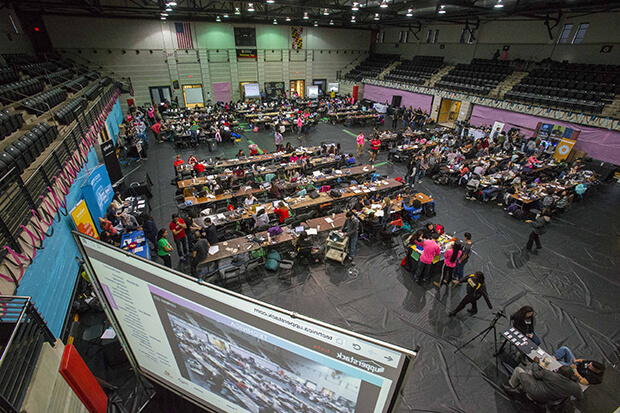- December 22, 2015
- By Chris Carroll
When Amritha Jayanti ’18 attended her first hackathon in April, she found it awash not just in caffeine—mandatory for a marathon 36-hour computer programming race—but also in testosterone. The nearly 1,100 participants at UMD’s Bitcamp were overwhelmingly male.
Although the gender discrepancy didn’t bother Jayanti as she and her team grappled with high-speed software development (hackathons aren’t about breaking into forbidden networks), it vexed female friends.
“You have all these guys around who talk like they know everything about the field, and are naming people and companies in computer science as if they know everyone,” she says. “Asking questions makes you feel like a burden.”
Even though they generally don’t have ill intentions, the young men’s geeky bravado might be keeping other women from getting involved, Jayanti says.
So today she’s the director of a new women-only hackathon, Technica, held at the university on Nov. 7–8. In an environment designed to be less cutthroat than a typical hackathon, nearly 400 participants collaborated on scores of projects ranging from new video games to hardware that creates a pulsing light show in response to musical tones.
It’s just one of the ways the University of Maryland is working to usher women into computing majors and jobs, something that impacts their future employability as well as the local and state economy.
 “Maryland has some of the highest demands for workers, particularly in the area of cybersecurity, but also for computing in general—and we aren’t able to meet them,” says Jandelyn Plane, a computer science senior lecturer and director of the Maryland Center for Women in Computing.
“Maryland has some of the highest demands for workers, particularly in the area of cybersecurity, but also for computing in general—and we aren’t able to meet them,” says Jandelyn Plane, a computer science senior lecturer and director of the Maryland Center for Women in Computing.
The center, founded in 2014 with support from the Maryland Center for Women in Computing Fund, encourages girls to consider computer science majors, and supports women once they’ve enrolled.
Computer science is a high-paying field; the average starting salary tops $60,000, according to a January report by the National Association of Colleges and Employers. A 2014 analysis of job postings nationwide by the Brookings Institution showed 160,000-plus vacancies in computer and mathematical occupations—more than in any other field. They’re also among the hardest to fill, with each position open an average of 39 days (gaps that rise to 46 and 47 days, respectively, in the Baltimore and Washington areas).
That means great job opportunities in high-paying fields, but women aren’t going for them.
According to the latest Department of Education statistics, men earned over four times as many undergraduate computer science degrees as women, with similarly disparate ratios at the graduate level. In fact, thousands more women earned computer science degrees in 1985 than they did in 2013.

To turn that around in Maryland, Plane oversees seven undergraduate “ambassadors” from the center who travel to schools and clubs around the state to nudge science and math-oriented girls toward computing careers and to advise teachers on how to support them.
Each summer, Plane also runs Computer Science Connect, a girls’ day camp that introduces skills like Web development, computer security and programming in popular languages. The goal is to expose girls to the broad range of possibilities in the field and help them connect socially with other girls who share similar interests.
One of the attendees at the July camp, Courtney Tse, 15, was glad boys were absent.
“It seems like they’re not worried if they mess things up and make mistakes,” says Tse, of Ellicott City. “I think if there were boys here, it would be harder, because it wouldn’t be as open.”
The goal is not gender segregation in computing, says Technica director Jayanti. It’s to help women realize they have the necessary skills to compete in the sea of testosterone.
“If we can introduce more women to it in a place that seems safer, they’ll realize what a hackathon is about,” she says. “And then later they’ll be comfortable in the coed environment.”
Tags
Student Experience